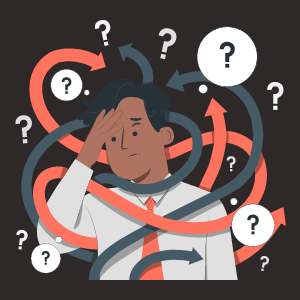Making Better Decisions in Busy World
Conquer decision fatigue in your hectic world. Explore strategies to navigate life's chaos and make sound decisions amidst a busy world. Discover insightful tips and practical advice for enhancing your decision-making skills on Gaur Gaurav's blog
Hit Pause!
I’ve been on break for the past few days, completely unplugged from work. It’s been a time of reflection, diving into fiction, and sometimes simply sitting and doing nothing. I’ve wandered through various Christmas markets and taken a few spontaneous day trips to nearby towns, enjoying holiday cheer. Sure, at times, I felt physically tired, but never exhausted. It made me realize how crucial it is to hit pause.
In our hectic day-to-day lives, we constantly find ourselves making decisions. From the moment we wake up - deciding on breakfast, travel to the office or work from home, and so on - to big decisions such as where to attend university, which car to buy, or where to live, each carrying its weight. Internet sources claim that we make roughly whooping 35,000 decisions a day! If we assume an adult sleeps for eight hours, thankfully decision-free, that amounts to more than 2,100 decisions per waking hour or about 3 decisions every 5 seconds.
Tech World of Constant Choices
In recent years, the software realm has experienced exponential growth and acceleration. Being an IT pro means mastering multiple tools, navigating diverse platforms, operating within larger teams, and meeting heightened client expectations to turn those innovative ideas into life. Take, for example, full-stack developers today—they are juggling front-end technologies, backend languages, databases, cloud solutions, web architecture, versioning, testing methodologies, and agile approaches. And guess what? That’s just scratching the surface! Diving into the front end alone, like choosing a JavaScript solution, you are filtering through numerous frameworks, each necessitating careful selection and combination for optimal outcomes. But wait, it does not end there, and the technology continually evolves, with new frameworks and significant updates emerging almost daily, making it nearly impossible to make a perfect decision.
We, tech professionals, encounter essential decisions that demand cohesive teamwork to devise strategies, deliver secure, scalable solutions, and visualise development roadmaps. These decisions necessitate focused efforts like workshops or sessions. Then, we have routine tasks such as coding, refining, and documenting, which need constant thinking.
Amidst these concrete decisions, we must make countless tiny choices, often termed micro-decisions. Should I respond to this Slack message now? Answer this call or let it ring? Must I attend this meeting? Does this email need an immediate reply? With our workplaces all tangled up in a web of apps, these tiny choices sometimes trip us up, disrupting our workflow and elevating stress levels.
The Cost of Choice: Decision Fatigue
Decision Fatigue isn’t a new concept; it was introduced by social psychologist Roy F. Baumeister. Every decision has a cost, tapping into our limited mental decision-making power. Keep making choices, and the strain piles up. Psychology professors Michael Inzlicht and Brandon Schmeichel suggested that there’s a cap to what we can accomplish in a day. Consequently, as our mental energy dwindles, it starts impacting our decision-making, specifically challenging choices. Instead of the most effective solution, we opt for a known effortless approach because the mental toll is lower.
I believe every developer has encountered one-dimensional reasoning – decisions that seemed sound initially but led to incidents in production. I’m no exception. I work in a platform team that creates and maintains shared business service libraries. I’ve seen scenarios where the team caught up in endless meetings and rushed changes towards the day’s end. Only to realize later that it suited only the team that asked for it, a quick fix. Instead, we needed a robust, more comprehensive, generalized, and future-proof solution that required much more effort and thoughtful decisions to benefit everyone.
As decision-making fatigue mounts so does stress. This piled-up stress can lead to burnout, affecting our job performance negatively. But it does not stop at work; it also seeps into our personal lives.
From Overwhelmed to Optimized
To ensure we are operating at our best, we must either avoid decision fatigue or design ways to recover. World leaders like Obama and Zuckerberg have their strategies to combat decision fatigue, keeping things simple with daily routines that preserve mental energy for critical decisions. Stealing their proven techniques could serve as an excellent starting point.
But apart from holding the mental energy, we can also refill it by taking regular breaks, especially when we notice signs of fatigue. I actively keep an eye out for these signals. For example, whenever I find myself easily distracted during work, I know something is going wrong. If I am checking phone notifications or skimming through news headlines more than I should, it is a clear sign that I have lost interest. Forcing myself to power through the task despite a lack of interest will drain my willpower unnecessarily. It is a clear signal for me to pause, take a breather, glance out the window, and get some fresh air.
Another effective method for me has been the Pomodoro Technique. It’s all about laser-focused work intervals. I lock into a 25-minute Google timer session, shutting down all notifications to banish distractions. No emails or Slack pings—just me and the task at hand. Then, after that intense session, I take a quick 5-minute breather. Trust me, after these power-packed sessions, I’ve consistently found myself more productive and less drained.
Final Words
The research and articles I referenced above suggest interesting hacks like avoiding late-day decision-making or simplifying decisions such as wardrobe with identical plain t-shirts and suits. But hey, not all studies have the same findings. For instance, in a study led by Stanford psychologist Carol Dweck and her colleagues, she concluded that waning willpower was apparent only in participants who believed willpower was a finite resource.
Decision-making isn’t a one-size-fits-all deal. While cutting down on small choices can save time and enhance efficiency, rigid routines might feel monotonous, confining, or impossible for some. Regardless, buying into the idea of limited decisiveness or willpower probably won’t do us any favour. Instead, I would say acknowledging that mental energy is a depleting resource and can drain over time, like a muscle that fatigues with exercise, can be practical to avoid exhaustion. I wish you more power in the year 2024. Happy New Year!



Comments powered by Disqus.